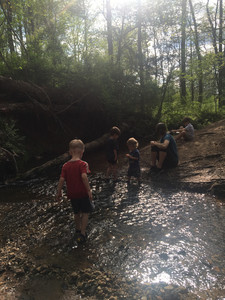What day is it?
- Katie Smith

- Apr 7, 2020
- 3 min read

Crisis has a way of creating lasting changes. I frequently refer to the birth of my second son as a major life-changing event. However, the events prior and just after his birth culminated in my overall chameleon act. I turned down an amazing opportunity to teach at the college level because I was unexpectedly pregnant again just after losing a baby. Then after my son's 12-week early arrival, my best friend was killed in a horrible car accident (a missionary mother of three little girls).
My life was quickly and abruptly changing, and I had zero control. I had a newborn with so many wires and widgets that he looked like a robotic replica of himself, and my recently potty-trained toddler was acting out in every way possible in order to gain some needed normalcy. We all needed a tether. My husband and I pressed into our faith, which brought us indescribable peace. It wasn't a sappy cliche, it was Biblical truths becoming realities that we could finally see, taste, and smell (the aroma of Christ). Yet, those same truths were not sufficient realities for our little boys, yet. They needed boundaries and a sense of structure to help them feel secure.
Day and night, water and land, natural divisions create boundaries that provide us with a sense of security. As many people today grapple with uncertainty and a loss of control because of the unprecedented coronavirus, we see the importance of natural rhythms and simple structures in our day-to-day lives. Without aid in arrangement, we forget what day, week, or month it is. Any new parent can attest to the reality of schedule fog, which occurs after bringing home their first infant. Our goals become basic and monotonous, yet we know the fog will lift after a short time. Many quarantined folks fear the length that this viral fog will last. How much more healthcare workers and their families?
Without a secured future, we begin to wander aimlessly. Even the well-known wanderer of Into the Wild, Christopher McCandless, kept a detailed journal in order to document days and dictate details for a sense of rhythm and routine. He was a searching soul desirous of spontaneity, flexibility, and freedom to eradicate standard societal norms. I'm in accord with his love of flexibility and spontaneity, but there are many under the age of 25 who are not prone to prioritize or prepare unless demanded by a paycheck or parent. Thus, the COVID quarantine will shake our emotions if we don't recognize our need for boundaries and anchors.
Whether it's a whiteboard of alliterated activities, a poster of devisable daily chores, or specified weekly goals, we can all, especially children, feel more at peace with simple structure. Rhythm and routines provide peace. As surely as the sun will come up tomorrow, it will go down again tonight. Rest assured that there is a season for everything under the sun. A "season to mourn" is upon us, but this too shall pass, and our mourning will soon turn to dancing.
When you aren't reading, cooking, walking, running, hiking, or playing family games, here are some interim online activities during quarantine spring break. This list is certainly not exhaustive, and if you are a parent of an older student or teen, I'm sure you can find many ways to engage including daily "essential question" (example of my own 10th grade curriculum outline with EQs) discussions and other adolescent critical thinking activities.
















































Mình có lần lướt đọc mấy trao đổi trên mạng thì thấy nhắc tới tg88 đăng nhập trong lúc câu chuyện đang nói dở, nên cũng mở ra xem thử cho biết. Mình không tìm hiểu sâu, chỉ xem qua trong thời gian ngắn để nhìn bố cục và cách sắp xếp nội dung tổng thể. Cảm giác là trình bày khá gọn, các mục rõ ràng nên đọc lướt cũng không bị rối, với mình như vậy là đủ để nắm thông tin cơ bản rồi trên tg88link.com.
Hôm nọ, mình có lướt mạng và thấy mọi người đề cập đến bongdaso khi thảo luận về kết quả các trận đấu, nên tò mò mở ra xem thử. Mặc dù không đi sâu vào chi tiết, nhưng mình đã xem qua cách sắp xếp thông tin và tỷ số, cảm giác khá dễ nhìn. Mọi thứ được trình bày rõ ràng, nên đọc lướt cũng không bị rối. Với mình, như vậy là đủ để cập nhật thông tin nhanh chóng trên bongdaso.org.
Another home run Katie. I love reading your heartfelt stories and gift of words to others. Praise God for your talent. Thank you for coming out of your “long” hiatus to share your gift with us.